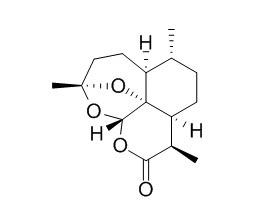Deoxyartemisinin
Deoxyartemisinin can inhibit microbial growth and reproduction,and is therefore likely to influence biochemical reactions in soils.
Inquire / Order:
manager@chemfaces.com
Technical Inquiries:
service@chemfaces.com
Tel:
+86-27-84237783
Fax:
+86-27-84254680
Address:
1 Building, No. 83, CheCheng Rd., Wuhan Economic and Technological Development Zone, Wuhan, Hubei 430056, PRC
Providing storage is as stated on the product vial and the vial is kept tightly sealed, the product can be stored for up to
24 months(2-8C).
Wherever possible, you should prepare and use solutions on the same day. However, if you need to make up stock solutions in advance, we recommend that you store the solution as aliquots in tightly sealed vials at -20C. Generally, these will be useable for up to two weeks. Before use, and prior to opening the vial we recommend that you allow your product to equilibrate to room temperature for at least 1 hour.
Need more advice on solubility, usage and handling? Please email to: service@chemfaces.com
The packaging of the product may have turned upside down during transportation, resulting in the natural compounds adhering to the neck or cap of the vial. take the vial out of its packaging and gently shake to let the compounds fall to the bottom of the vial. for liquid products, centrifuge at 200-500 RPM to gather the liquid at the bottom of the vial. try to avoid loss or contamination during handling.
Nutrients.2023, 15(4):950.
Life Sci.2023, 317:121458.
World J Mens Health.2019, 10.5534
Biomed Pharmacother.2020, 128:110318.
Plants (Basel).2020, 9(11):1535.
Pharmaceutical Chemistry Journal2019, 52(12):986-991
Front Microbiol.2022, 12:833233.
Molecules.2019, 24(4):E744
Appl. Sci.2020, 10(16),5482.
ACS Omega2020, 5,33,20825-20830
Related and Featured Products
Z Naturforsch C. 2010 Sep-Oct;65(9-10):607-12.
Bioconversion of artemisinin to its nonperoxidic derivative deoxyartemisinin through suspension cultures of Withania somnifera Dunal.[Pubmed:
21138064]
METHODS AND RESULTS:
Biotransformation of artemisinin was investigated with two different cell lines of suspension cultures of Withania somnifera. Both cell lines exhibited potential to transform artemisinin into its nonperoxidic analogue, Deoxyartemisinin, by eliminating the peroxo bridge of artemisinin. The enzyme involved in the reaction is assumed to be artemisinin peroxidase, and its activity in extracts of W. somnifera leaves was detected.
CONCLUSIONS:
Thus, the non-native cell-free extract of W. somnifera and suspension culture-mediated bioconversion can be a promising tool for further manipulation of pharmaceutical compounds.
Acta Prataculturae Sinica, 2015, 24(11):29-37.
Artemisinin and flavonoids in wild Artemisia annuaand surrounding soil and the influence on soil microbes[Reference:
WebLink]
Artemisia annua releases various kinds of allelochemicals into soils via rain leaching,root exudation and dead tissue decomposition during the growing season,with resulting inhibition of the growth and development of adjacent plants and succeeding crops.
The present experiments were thus conducted to detect artemisinin derivatives,flavonoids and effects on soil microbes in wild A.annuaand surrounding soil.
METHODS AND RESULTS:
The allelochemical concentrations ranked:bud break periodearly flowering periodfull bloom periodvegetative growth period(artemisinin in leaves and root zone soil)and stemleafrootflower(flavonoids in plants).In sampled soils,the mean concentration of Deoxyartemisinin was highest,followed by artemisic acid and artemisinin in soil and the sum of these artemisinin derivatives was 516.93μg/kg dry soil.Concentrations of all three compounds tested were highest in root surface soil and much higher in the root surface soil and rhizosphere soil than in non-rhizosphere soil.Soil flavonoid concentrations increased steadily during the growing season of A.annua and reached their highest levels at full-bloom stage(434.77μg/kg dry soil).
CONCLUSIONS:
Hence it is concluded that flavonoids are released into soils through root exudation.The numbers of bacteria and actinomycetes showed significant negative correlations with artemisinin concentration(r=-0.508*and-0.478*,n=24).There was also a negative correlation between deoxyartemsinin contents and actinomycete numbers(r=-0.528**,n=24).In summary,artemisinin and its derivatives released fromA.annuaappear to inhibit microbial growth and reproduction,and are therefore likely to influence biochemical reactions in soils.



